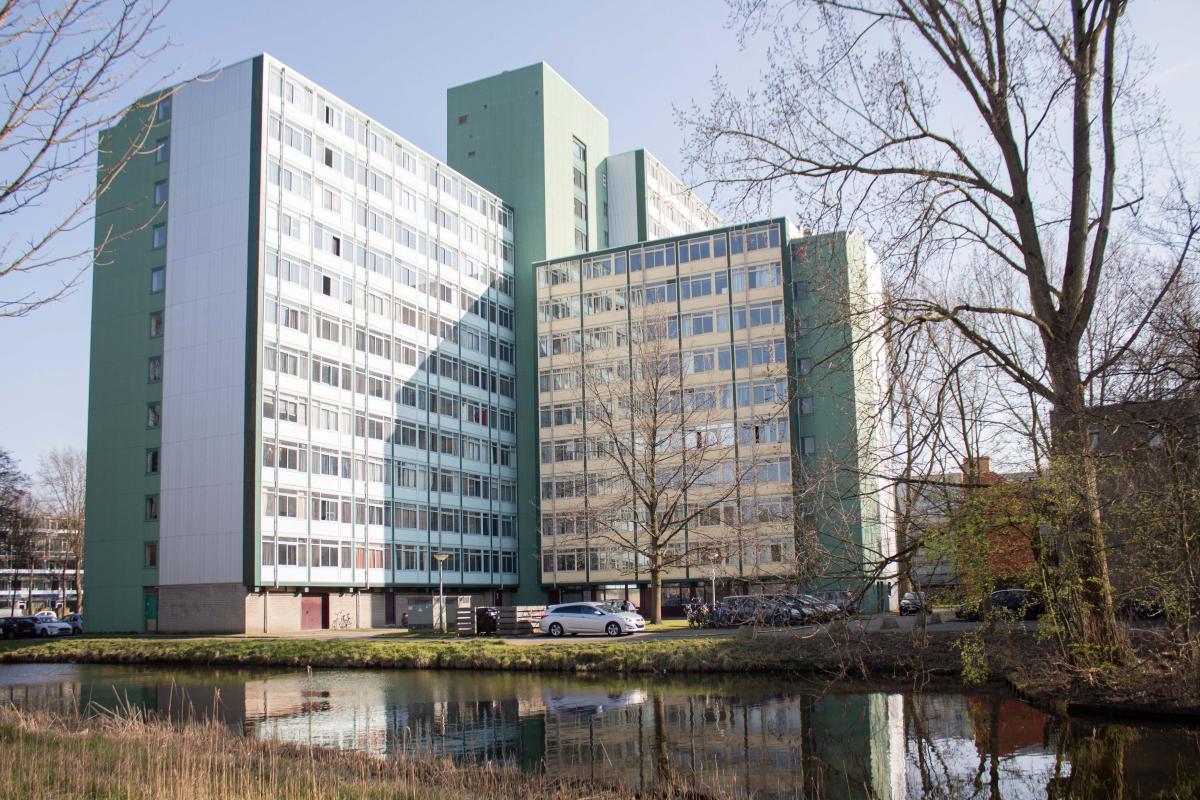The National Student Housing Action Plan, announced with much fanfare, is supposed to solve the room shortage. What does this mean for Delft? “This plan does exactly nothing.”
Student housing at the Van Hasseltlaan in Delft. (Photo: Justyna Botor)
Amid many rumour, the Landelijk Actieplan Studentenhuisvesting (national plan of action for student accommodation) was presented a couple of weeks ago. The document of almost 40 pages, (in Dutch) promises to build more than 60,000 affordable student housing units. “Every student deserves a place to live, and that is why I am so happy with this action plan,” said Minister Dijkgraaf of Education, Culture and Science, closing a social media video(in Dutch) to the sound of upbeat music in the background.
The plan does not specify the number of rooms that the Cabinet and other signatories such as municipalities, social housing providers, commercial housing providers and universities, want to build where. According to municipal forecasts, the shortfall in student rooms in Delft will be between 5,260 and 6,111 units by 2030.
The plan does not mean that the Municipality of Delft, Duwo and TU Delft will be working on new building plans, they commented to Delta. Instead, the municipality points to the coalition agreement that the coalition political parties agreed to earlier this year. ‘The agreement states the goal of adding an additional 1,000 student units by 2030 on top of the 2,500 increase in Delft and its surroundings by 2026’, writes a spokesperson.
Extra residential floors
Duwo’s Director, Tom Hoekveld, says that Duwo is looking for new solutions for more student housing in Delft. “But nothing is confirmed yet. We are looking into where we can ‘densify’ and ‘top up’ residences.” By ‘densify’, Hoekveld means creating additional student rooms in Duwo buildings. “There are places, for example, where you can make 15 rooms instead of 13,” he explains. By ‘top up’, he means building new floors on top of existing Duwo buildings. Duwo and TU Delft are also working on plans for 660 temporary student housing units at the end of the Heertjeslaan in Delft-Zuid.
‘This plan will do absolutely nothing’
While Delft can really use a plan of action with the increasing shortage in rooms, Maartje Martens, an independent housing market analyst, believes that the proposed measures will be meaningless. “This plan will do absolutely nothing,” she says. “It is all good intentions, but those involved are looking into this, have to comply with that, and so on. The housing shortage may be urgent, but the problem is so complex and there are so many things to take into consideration that I am not very positive about the plan.”
She points out the scarce land available for building on in Delft and to the ever increasing construction costs. “The whole market is stuck. There is not only a shortage of student housing, but also of social housing, housing for first time buyers, for senior citizens and so on and so forth. The plan hardly touches on these issues at all.”
‘Not a magic wand’
Furthermore, many of the measures and solutions mentioned in the plan are already underway in Delft. It states that municipalities, universities and housing providers must regularly consult with each other. This is already being done in Delft in the ‘bestuurlijk overleg studentenhuisvesting’ (administrative consultation on student accommodation) where Duwo administrators, the Municipality of Delft and TU Delft meet. And measures such as finding building ground in surrounding municipalities, informing international students of the housing shortage and the temporary use of campus land for student accommodation are not new. Duwo Director Tom Hoekveld says that “We are already doing a lot of what is contained in the plan in Delft. The plan is not a magic wand that will solve everything.” Nevertheless, he believes that a national plan of action can make a difference. “This plan gives the shortage of rooms for students greater urgency. It also helps enormously that is it signed by two ministries.”
TU Delft Policy Advisor Danko Roozemond agrees . “This plan lets you make local agreements more easily as they are underpinned by national measures. There was a similar national plan of action three years ago after which the Municipality of Delft created the position of project leader for student accommodation. A national action plan can make a difference.” He continues. “There are a couple of new measures which I am hopeful about. One is that the Ministry of Interior and Kingdom Relations is looking into whether it can make building and renting shared accommodation more attractive.”
Private room rentals
Housing market analyst Martens is concerned that the attention for student housing will be at the cost of building other types of housing in Delft. Even more so, she believes that the plan even pushes aside other building needs. “Social rented housing, for example, where there is also a significant shortage.”
Another possibility is forcing out private room rentals. Encouraging this type of accommodation for students is also part of the plan, while the Municipality of Delft just started the ‘Kamers met Aandacht’ (rooms with attention) project. This project connects vulnerable young people with a landlord/landlady whereby the young people receive guidance from their own youth social worker.
Delta wanted to know how the Municipality can prevent students from pushing out these vulnerable young people. The Municipality says that it does not have any specific measures for this at the moment. “Kamers met Aandacht and private room rentals can coexist. It is up to the landlord/landlady to choose the type of tenant and, if relevant, the type of mediation. The rules for private room rental are the same in all cases,” says the Municipality spokesperson.



Comments are closed.